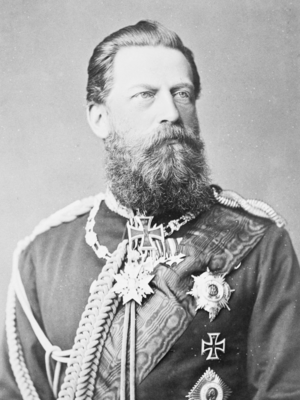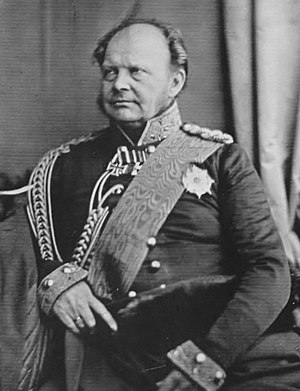Discover Your Roots
SIGN UPDiscover Your Roots
SIGN UPFrederick is a classic male name of English origin that means "Peaceful Ruler". Its roots can be traced back to the Germanic elements "frid" for peace and "ric" for ruler or power. The name Frederick has been a popular choice for boys historically, with variations such as Friedrich in German and Federico in Italian. Notable figures bearing this name include kings of Denmark, Sweden, Prussia, and Württemberg, as well as Holy Roman Emperors. Outside of royalty, Frederick has been associated with influential individuals such as Frederick Douglass, a prominent African-American social reformer and statesman. In literature, the name is also recognized through fictional characters like Frederick Kreiburg. With its strong and noble meaning, Frederick remains a timeless and distinguished name choice for boys.

Frederick Douglass, born into slavery in Maryland in 1818, became a prominent leader in the 19th-century African-American civil rights movement. After escaping slavery, he emerged as a powerful abolitionist, orator, writer, and statesman. Douglass's eloquence and influential antislavery writings garnered him national recognition. His autobiographies, including "Narrative of the Life of Frederick Douglass, an American Slave" and "My Bondage and My Freedom," played a significant role in advocating for abolition. After the Civil War, he actively campaigned for the rights of freed slaves and supported women's suffrage. Douglass was also the first African American nominated for vice president of the United States. He advocated for dialogue and alliances across racial and ideological divides, emphasizing the importance of doing right. Despite being separated from his mother at a young age, Douglass's resilience and determination led him to become a leading voice in the fight against slavery and for civil rights. His legacy continues to inspire and educate people around the world.

Frederick III (Friedrich Wilhelm Nikolaus Karl; 18 October 1831 – 15 June 1888) served as the German Emperor and King of Prussia for a brief 99 days in 1888. Known as "Fritz," he was the only son of Emperor Wilhelm I and was raised in a tradition of military service. His marriage to Victoria, Princess Royal, the eldest child of Queen Victoria of the United Kingdom, was based on shared liberal ideals, leading them to advocate for progressive and democratic reform. Frederick, influenced by his ties with Britain and studies at the University of Bonn, developed liberal tendencies despite his family's conservative background. As crown prince, he opposed the conservative Chancellor Otto von Bismarck, advocating for curbing executive power in favor of the Reichstag. Frederick and Victoria aspired to rule jointly, instituting responsible government and transforming the German Empire into a liberal constitutional monarchy inspired by Britain. However, Frederick's premature death from cancer at 56 thwarted these plans, and his successor, Wilhelm II, abandoned the reforms. The brevity of Frederick's reign and the potential liberalization of the German Empire had he lived longer remain topics of historical debate. Frederick's upbringing, marriage, and his liberal tendencies in the midst of a tumultuous political period in Germany shaped his brief but impactful reign.

Frederick William III (German: Friedrich Wilhelm III; 3 August 1770 – 7 June 1840) reigned as King of Prussia from 1797 until his death. He also served as the Elector of Brandenburg in the Holy Roman Empire until its dissolution in 1806. His rule coincided with the tumultuous Napoleonic Wars, during which he reluctantly joined the Sixth Coalition against Napoleon in 1813. Following Napoleon's defeat, Frederick William III played a key role in the Congress of Vienna, which aimed to settle the political landscape of post-Napoleonic Europe. Throughout his reign, he focused on internal reforms, particularly in the Protestant churches of Prussia, aiming to centralize royal control over them. Known for his shyness and indecisiveness, he heavily relied on his wife, Queen Louise, and a group of influential advisors to implement reforms in administration, churches, finance, and the military. Despite his reserved nature, he was dedicated to his duties and his country's well-being. Frederick William III's legacy is also tied to being the dedicatee of Beethoven's Ninth Symphony in 1824. His early life was marked by a shy and reserved nature, shaped by neglect from his father and a melancholic upbringing. He married Louise of Mecklenburg-Strelitz and had ten children, living a problem-free and beloved marriage. Upon ascending the throne, he made efforts to cut down royal expenses, dismiss his

Frederick McCarthy Forsyth, born on August 25, 1938, is a renowned English novelist and journalist known for his gripping thrillers, including The Day of the Jackal, The Odessa File, The Fourth Protocol, The Dogs of War, and many more. His works have consistently appeared on best-sellers lists and have been adapted into numerous films, with over 70 million books sold in more than 30 languages by 2006. Forsyth's career began with his service as a pilot in the Royal Air Force, followed by roles at Reuters and the BBC, where he covered significant events such as the Nigerian Civil War. Apart from his writing, he has contributed to radio broadcasts and newspapers, and has even narrated various documentaries. Forsyth's journey into fiction writing was driven by financial necessity, but his meticulous research and storytelling skills led to international acclaim and awards, such as the Edgar Allan Poe Award for Best Novel. His novels have been adapted into successful films, captivating audiences with their compelling narratives. Forsyth's influence in the literary and journalistic world is undeniable, and his works continue to captivate readers worldwide.

Frederick William IV (German: Friedrich Wilhelm IV; 15 October 1795 – 2 January 1861) was the King of Prussia from 1840 until his passing in 1861. Known as the "romanticist on the throne," he held deeply religious beliefs and ruled based on the concept of divine right. Despite his conservative political philosophy, he initially pursued a moderate policy, easing press censorship, releasing political prisoners, and reconciling with the Catholic population. During the German revolutions of 1848–1849, he accommodated revolutionary sentiments but rejected the title of Emperor of the Germans offered by the Frankfurt Parliament. He dissolved the Prussian National Assembly in 1848 and imposed a constitution with a parliament and a strong monarch to prevent unrest. Frederick William IV also had an artistic nature and an interest in architecture, contributing to the cultural landscape of various sites now recognized as UNESCO World Heritage Sites. He suffered from incapacitating strokes from 1857 until his death, during which his brother William served as regent and eventually succeeded him as king. Born to Frederick William III and Queen Louise, Frederick William IV's early life was influenced by the revolutionary challenge of the French Revolution and the family's experiences during the Napoleonic Wars. His education and experiences shaped his conservative worldview and his dedication to historical continuity and tradition.
All images displayed on this page are sourced from Wikipedia or Wikimedia Commons.We use these images under their respective Creative Commons or public domain licenses. Wherever applicable, author attributions and license information are provided. If you believe an image is used incorrectly or outside its license terms, please contact us so that we can review and correct the issue.